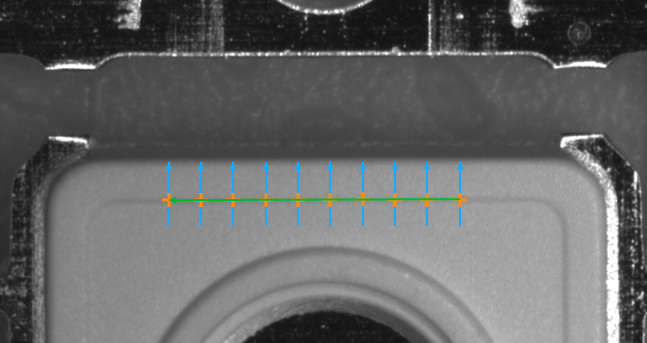You are here: Start » AVL.NET » Function Reference » Computer Vision » Shape Fitting » AVL.FitSegmentToRidges_Direct
Performs a series of 1D ridge detections and finds a segment that best matches the detected points.
| Namespace: | AvlNet |
|---|---|
| Assembly: | AVL.NET.dll |
Syntax
public static void FitSegmentToRidges_Direct ( AvlNet.Image inImage, AvlNet.SegmentFittingField inFittingField, AvlNet.CoordinateSystem2D? inFittingFieldAlignment, int inScanCount, int inScanWidth, AvlNet.SamplingParams inSamplingParams, AvlNet.RidgeScanParams inRidgeScanParams, AvlNet.Selection inRidgeSelection, AvlNet.LocalBlindness? inLocalBlindness, float inMaxIncompleteness, AvlNet.LineMEstimator? inOutlierSuppression, out AvlNet.Segment2D? outSegment, NullableRef<List<AvlNet.Ridge1D?>> outRidges, NullableRef<NullableRef<AvlNet.Profile>> outDeviationProfile, NullableValue<AvlNet.SegmentFittingField> outAlignedFittingField, NullableRef<List<AvlNet.Point2D>> outInliers )
Parameters
| Name | Type | Range | Default | Description | |
|---|---|---|---|---|---|
 | inImage | AvlNet.Image | Image to fit segment to. | ||
 | inFittingField | AvlNet.SegmentFittingField | Segment fitting field. | ||
 | inFittingFieldAlignment | AvlNet.CoordinateSystem2D? | Adjusts the fitting field to the position of the inspected object. Default value: atl::NIL. | ||
 | inScanCount | int | <3, INF> | 10 | The number of points that will be searched to estimate the position of the segment. Default value: 10. |
 | inScanWidth | int | <1, INF> | 5 | The width of each scan field (in pixels). Default value: 5. |
 | inSamplingParams | AvlNet.SamplingParams | Parameters controlling the sampling process. | ||
 | inRidgeScanParams | AvlNet.RidgeScanParams | RidgeScanParams ( ProfileInterpolation: Quadratic4 SmoothingStdDev: 1.0f RidgeWidth: 5 RidgeMargin: 2 MinMagnitude: 5.0f RidgePolarity: Dark ) | Parameters controlling the ridge extraction process. Default value: RidgeScanParams ( ProfileInterpolation: Quadratic4 SmoothingStdDev: 1.0f RidgeWidth: 5 RidgeMargin: 2 MinMagnitude: 5.0f RidgePolarity: Dark ). | |
 | inRidgeSelection | AvlNet.Selection | Selection mode of ridges. | ||
 | inLocalBlindness | AvlNet.LocalBlindness? | Defines conditions in which weaker ridges can be detected in the vicinity of stronger ridges. Default value: atl::NIL. | ||
 | inMaxIncompleteness | float | <0.0f, 0.999f> | 0.1f | Maximal fraction of ridge points not found. Default value: 0.1f. |
 | inOutlierSuppression | AvlNet.LineMEstimator? | Selects a method for ignoring incorrectly detected points. Default value: atl::NIL. | ||
 | outSegment | AvlNet.Segment2D? | Fitted segment or nothing if the fitting fails. | ||
 | outRidges | AvlNet.NullableRef<System.Collections.Generic.List<AvlNet.Ridge1D?>> | Found ridges. Can be null to skip this parameter calculation. | ||
 | outDeviationProfile | AvlNet.NullableRef<AvlNet.NullableRef<AvlNet.Profile>> | Profile of distances between the actual segment points and the corresponding reference segment points. Can be null to skip this parameter calculation. | ||
 | outAlignedFittingField | AvlNet.NullableValue<AvlNet.SegmentFittingField> | Fitting field used; in the image coordinate system. Can be null to skip this parameter calculation. | ||
 | outInliers | AvlNet.NullableRef<System.Collections.Generic.List<AvlNet.Point2D>> | Points matching the fitting segment. Can be null to skip this parameter calculation. |
Description
The operation tries to fit a given segment to ridges present in the inImage image. Internally, it performs a series of scans with the ScanSingleRidge_Direct filter along inScanCount specific scan segments which length is always equal to the inFittingField width and cannot be less than 4. The found points are then used to determine the actual position of the segment in the image. Only inMaxIncompleteness fraction of these scans may fail. If the fitting according to the given parameters is not possible, outSegment is set to Nil.
Examples

Fitting a segment to a line on an object
(inRidgeScanParams.RidgePolarity = Dark).
Remarks
Read more about Local Coordinate Systems in Machine Vision Guide: Local Coordinate Systems.
This filter is a part of the Shape Fitting toolset. To read more about this technique, one can refer to the Shape Fitting chapter of our Machine Vision Guide
Hardware Acceleration
This operation supports automatic parallelization for multicore and multiprocessor systems.
Hardware acceleration settings may be manipulated with Settings class.
Function Overrides
- FitSegmentToRidges_Direct(Image, SegmentFittingField, Int32, Int32, SamplingParams, RidgeScanParams, Selection, Single, Nullable<Segment2D>)
- FitSegmentToRidges_Direct(Image, SegmentFittingField, Nullable<CoordinateSystem2D>, Int32, Int32, SamplingParams, RidgeScanParams, Selection, Nullable<LocalBlindness>, Single, Nullable<LineMEstimator>, Nullable<Segment2D>)
- FitSegmentToRidges_Direct(Image, SegmentFittingField, Nullable<CoordinateSystem2D>, Int32, Int32, SamplingParams, RidgeScanParams, Selection, Nullable<LocalBlindness>, Single, Nullable<LineMEstimator>, Nullable<Segment2D>, IList<Nullable<Ridge1D>>, INullable<Profile>, SegmentFittingField, IList<Point2D>, IList<Segment2D>, IList<Rectangle2D>, IList<Profile>, IList<Profile>)
- FitSegmentToRidges_Direct(Image, SegmentFittingField, Nullable<CoordinateSystem2D>, Int32, Int32, SamplingParams, RidgeScanParams, Selection, Nullable<LocalBlindness>, Single, Nullable<LineMEstimator>, Nullable<Segment2D>, NullableRef<List<Nullable<Ridge1D>>>, NullableRef<NullableRef<Profile>>, NullableValue<SegmentFittingField>, NullableRef<List<Point2D>>, IList<Segment2D>, IList<Rectangle2D>, IList<Profile>, IList<Profile>)

